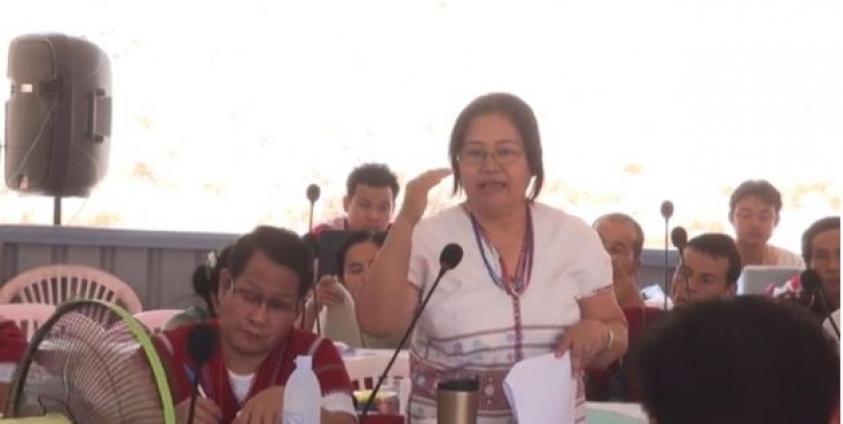Karen representatives from various parts of Burma and overseas got together in move to prepare for forthcoming national peace talks pointed out that despite Burma having democratically elected government the military continues to hold power under the country’s current constitution.
More than 150 Karen representatives traveled to the Karen National Union’s Law Khee Lar, Hpa-an District to discuss major issues critical to Karen people.
Among the attendees was Padoh Naw Zipporah Sein, vice-chairperson of the KNU. Padoh Naw Zipporah Sein said that the National League for Democracy led Burma government was elected by the people, but was having to work under the 2008 Constitution. Ms Sein pointed out that the military was effectively pulling the strings and had kept most of the decision making power on major issues.
Speaking to Karen News, Ms Sein said.
“When we look at this new government, we can say that they are a democratic government, as they were elected by the people. When we look at their [NLD’s] policies, they’re not so different from what ethnic nationalities want. The problem is that they are working under the 2008 Constitution which puts the governing system under the influence of the military – the military still has the power.”
The Karen representatives including politicians, academics, activists, religious leaders, military, civil society and community-based-organizations attended the five-day Karen National Consultation Conference held on the third week of May, 2016.
The aim of the Karen conference was to encourage Karen people to express their views and opinions on important issues to try to find a common position on issues such as political, security and defense, governance and social affairs, the economy, land rights and natural resources.
Padoh Naw Zipporah Sein said that the conference was helpful for the future work needed to be done for the peace talks.
“Karen representatives enthusiastically took part in the meeting. The results should form a platform where we can work together in the future. This is the step where we came up with a common position. The next step, we need to meet with Karen communities in different places to collect their views.”
Mahn Kyaw Nyein, general secretary of the Irrawaddy Delta based Karen National Party who attended the conference said that he was happy to see there was more inclusiveness of Karen people.
“I am so glad to come here to discuss about our Karen future. We openly discussed what we hoped for our people. We discussed five main topics essential for our Karen people’s future. I was glad to see that Western-Pwo Karen from the [Irrawaddy] Delta join our discussions.”
Mahn Aung Pyi Soe, vice-chairperson, of the Karen State based Plone Swor Democratic Party and a member of the Karen Unity and Peace Committee said that Karen leaders need to be brave when talking about Karen affairs with the government.
“We tried to get common position on the five topics which we will take to the next level. I want to suggest to our representatives at the political dialogue that we need to be courageous to speak about Karen affairs and repeatedly talk about it.”
The KNU’s Padoh Naw Zipporah Sein said that the NLD led government has policies that are similar to the ethnic nationalities, but the success of any future political dialogue will be determined by how much the military will compromise.
“One of the basic principles that they [government] made clear is the establishment of a Federal Union. It is not just the NLD’s policy, it becomes the ruling government’s policy. We consider this as the guaranteed direction where this government is heading. In terms of changing or amending the 2008 Constitution, their position is the same as that of our ethnic nationalities.”
Despite her optimism about the NLD election win Ms Sein pointed out that the military involvement and influence had a bearing on how the NLD governed.
“We cannot say that all our hopes are now a reality because the military still has 25% of parliamentary seats and [to move forward] it depends on the cooperation of the military.”








